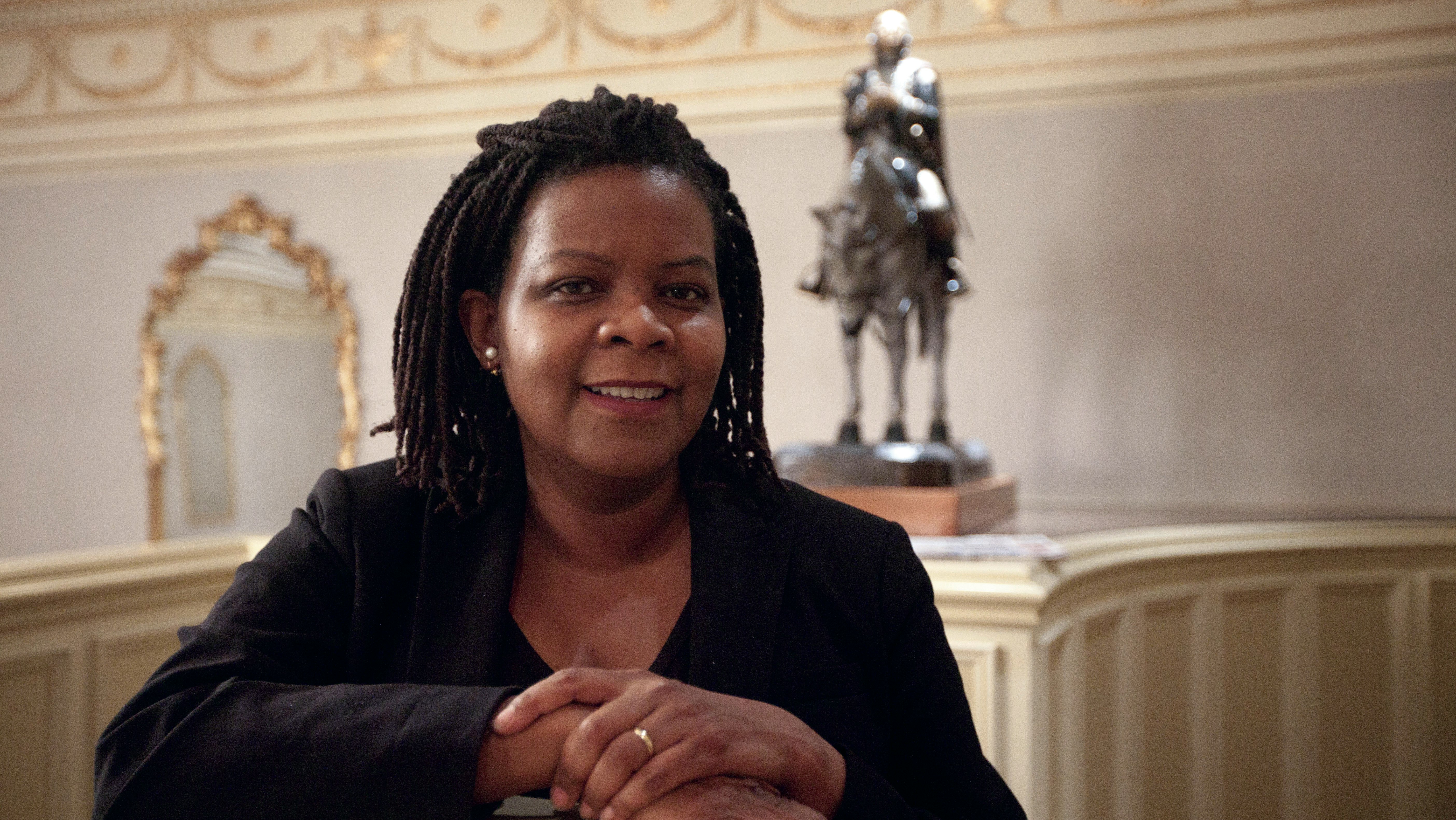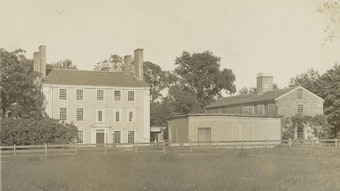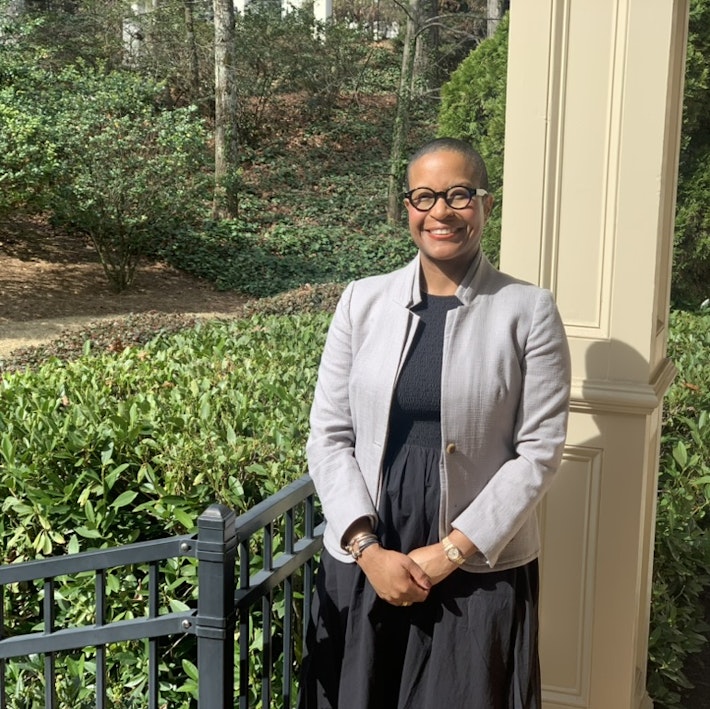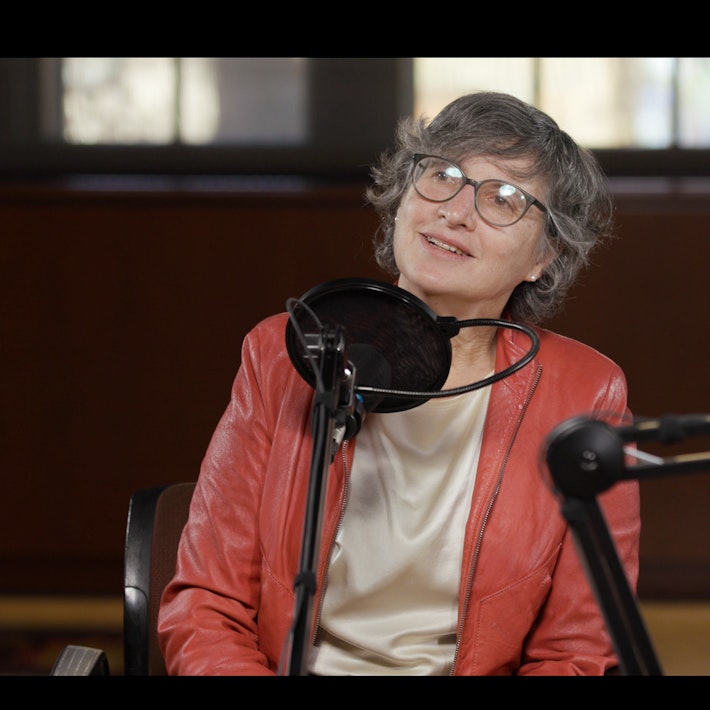Annette Gordon-Reed on Thomas Jefferson

Thomas Jefferson is back on the public stage (if he was ever absent), the subject of new books, discussions, conflict, and scrutiny. Like Lincoln, Jefferson still has a hold on us, perhaps because he’s so complicated: a slaveholder who wrote in the Declaration of Independence that all men are created equal.
One of the foremost scholars of Jefferson, Annette Gordon-Reed, is currently in residence at the Radcliffe Institute. The Carol K. Pforzheimer Professor at Radcliffe, the Charles Warren Professor of American Legal History at Harvard Law School, and a professor of history in the Faculty of Arts and Sciences, Gordon-Reed has been writing about Jefferson since 1995, when she began work on her first book, Thomas Jefferson and Sally Hemings: An American Controversy (University Press of Virginia, 1997).
An investigation of the controversy about whether Jefferson fathered children with his slave mistress Sally Hemings, the book established Gordon-Reed as a historian, although her academic training is in law. She went on to write her bestselling book The Hemingses of Monticello: An American Family, for which she won the Pulitzer Prize and 15 other awards. And she’s currently working on a book about Jefferson’s intellectual development, ‘The Most Blessed of Patriarchs’: Thomas Jefferson and the Empire of Imagination, excerpted below.
As a bookish child growing up in East Texas, Gordon-Reed was more interested in biographies of Jefferson than in those of George Washington Carver or James Madison. “I thought it was interesting that he was a slave owner but wrote the Declaration of Independence,” she said recently in her office at Radcliffe’s Byerly Hall. “That was a real introduction to paradox for me at a very young age.” She continued to be interested in Monticello and slavery, but never thought she’d write a book about any of these subjects, much less several books.
During college at Dartmouth—in one of the first classes that admitted women, when the ratio was three men to one woman—she majored in history. Deeply affected by the civil rights movement, she also wanted to do good in the world, so she went to Harvard Law School, where she met her husband, Robert Reed, now a judge in New York City.
In 1995 Gordon-Reed and her husband were living in Battery Park City with their two children and she was teaching at New York Law School when she saw a film called Jefferson in Paris. “Even before it came out, a number of people were outraged because the movie was going to treat the Sally Hemings story as if it were true,” she said. “That’s when people were saying there’s no evidence for this, that Jefferson wouldn’t have been involved with a slave girl.” Reacting to this reaction, Gordon-Reed sat down to write an op-ed piece and couldn’t stop writing.
“I was not tenured yet, and I should have been writing a law review article, but I wrote the book,” she said. “I didn’t tell anybody I was writing it except my husband.”
She started writing in January and had a first draft by April. She talked to people at Monticello about it and also shared the manuscript with several scholars, including Peter Onuf, the chair of the history department at the University of Virginia, which Jefferson founded, and the Thomas Jefferson Memorial Foundation Professor. Onuf urged the University Press of Virginia to publish it.
In the meantime, one of Gordon-Reed’s colleagues had read the manuscript and sent it to Robert Weil, an editor at St. Martin’s Press, who also wanted to publish it. “But I wanted to go with Virginia,” she said, “because of the subject matter and because that’s Jefferson’s university.” Several years later, she signed a contract with Norton, where Weil had become an editor, for The Hemingses of Monticello.
Gordon-Reed was recruited to the Harvard faculty in the spring of 2010 with a Radcliffe professorship, a term position that provides her with four semesters at the Radcliffe Institute’s Fellowship Program during her first five years at Harvard.
Time and fellowship are two things she will sorely need to complete the books she intends to write. After the one on Jefferson’s intellectual development, which she’s writing with her friend Peter Onuf, she’ll return to the Hemingses and follow several branches of the family further into the 19th century. (Her earlier book leaves them at Jefferson’s death in 1826.) Then she plans to write a two-volume biography of Jefferson.
Gordon-Reed’s biography will join an already-crowded field of books on Jefferson, two of which came out this past fall, to mixed reviews. Jill Abramson ’76, the executive editor of the New York Times, reviewed Jon Meacham’s book Thomas Jefferson: The Art of Power (Random House, 2012) on the front page of the New York Times Book Review on November 11. Meacham “guides us through the entire life,” she wrote, “but without much color or drama.”
Master of the Mountain: Thomas Jefferson and His Slaves (Farrar, Straus and Giroux, 2012), by Henry Wiencek, attracted attention that “most authors can only dream of,” as Jennifer Schuessler ’90 put it in her New York Times article on November 27. Master was excerpted in Smithsonian and featured on the magazine’s cover; reviewers spoke highly of it. And then the scholars began to weigh in. Schuessler mentioned Rutgers historian Jan Ellen Lewis’s review in The Daily Beast as being especially blunt. “It’s hard to know what to make of this train wreck of a book,” Lewis wrote. “Much of what Wiencek presents as ‘new information’ has already been published in the groundbreaking work of Annette Gordon-Reed, Lucia Stanton, and others, while the most headline-grabbing charges crumble under close scrutiny.”
Gordon-Reed reviewed Wiencek’s book in Slate, in a piece under the headline “Thomas Jefferson Was Not a Monster.” Wiencek “loathes Thomas Jefferson,” she wrote. "In his attempted takedown of the man, the third president appears as a demonic figure warped one summer day by a sudden discovery that being a slaveholder could pay.”
Master of the Mountain “fails as a work of scholarship,” she said, partly because of Wiencek’s erroneous thesis: he interprets a note Jefferson wrote in the summer of 1792 about making a 4 percent profit every year on the birth of black children as applying to Monticello slaves, when the note was generally understood to be about slaves in all of Virginia.
Scholarly considerations aside, Gordon-Reed’s view of Jefferson appears to be much more complicated than Wiencek’s. After she published her first book, she told an interviewer from PBS’s Frontline, “I believe [Jefferson] is ordinary in his prejudices. . . . A critical mass of people have, over the years, acted as if whites are more intelligent than blacks, that whites are more attractive than blacks. It’s part of a common currency, more common than people want to admit. And so he is used, I think, in some ways, as a scapegoat.” In other words, if we can make Jefferson a monster, the rest of us can be less monstrous.
With her base still in New York, Gordon-Reed travels between there and Cambridge every week. Last spring, her daughter graduated from Harvard, so now she has no family in Cambridge. (Her son is at Dartmouth.) But she has her work and the Radcliffe community.
“I had one sabbatical in my career before I came here, and even then I was teaching,” said Gordon-Reed. “The Radcliffe professorship is giving me time to do my work.”
Excerpt From
“The Most Blessed of Patriarchs”: Thomas Jefferson and the Empire of Imagination
Differences Between New England and Virginia, Northerners and Southerners
By Annette Gordon-Reed
Thomas Jefferson’s favorite granddaughter Ellen, newly married at Monticello to Bostonian Joseph Coolidge, traveled north to start a new life in her husband’s home in July 1825. She covered territory familiar to her grandfather, for her route through upstate New York, Vermont, and Massachusetts closely tracked the “botanical expedition” that he had taken with James Madison in the summer of 1791, his deepest penetration into the heartland of his archenemies, the Federalists.
By the time Ellen visited the North country, much had changed. The new state of Vermont had only been admitted to the union in March 1791, and its booming population of 85,425 was just beginning to transform forests into fields—where its mountainous terrain allowed. Her first, glowing report on the progress of civilization on the Yankee frontier offered a gratifying image of America’s future, a demonstration of the benign effects of the republican revolution that Jefferson, the author of “the great Charter of our Independence,” had helped initiate. Ellen reported, “the country is covered with a multitude of beautiful villages.” She was amazed that Yankee farmers had wrung such abundance from “the hard bosom of a stubborn and ungrateful land.” Despite a cold and forbidding climate, “the fields are cultivated and forced into fertility; the roads kept in the most exact order; the inns numerous, affording good accommodations; and travelling facilitated by the ease with which post carriages and horses are always to be obtained.”
The contrast with Ellen’s native “country” was striking. Virginians were blessed with the “great gifts of Nature,” she wrote, “but had squandered the “advantages of soil and climate which we possess over these people.” Improvement was the great watchword of an enlightened age, and her grandfather was the foremost proponent of the concept. There was, however, precious little improvement to be seen in Ellen’s native state, more than two centuries after its first settlement. Jefferson’s Albemarle County was located on the provincial frontier at the time of his birth, and more than 80 years after that, travelers to his mountaintop home still encountered a near wilderness. What had Virginians been doing in those intervening years? Not much, according to one witness. “No vestige of the labour of man appeared,” Washington socialite Margaret Bayard Smith wrote in her diary in 1809: as she ascended Jefferson’s mountain, “nature seemed to hold an undisturbed dominion.” She was shocked to encounter the progressive philosopher in such retrograde physical surroundings. But for his spectacular house, there was no sign of civilization.
Ellen had spent a great deal of her early childhood at Monticello. She knew her grandfather well and knew that he would be particularly interested in her observations, for he had devoted his public career to the improvement of the new nation and particularly of his beloved Virginia. Ellen had a simple—and devastating—explanation for the stark differences between New England and Virginia: “our Southern States cannot hope” to match the “prosperity and improvement” of the northern states “whilst the canker of slavery eats into their hearts, and diseases the whole body by this ulcer at the core.”
Ellen could have read a similar indictment in her grandfather’s only published book, Notes on the State of Virginia (1787), in which Jefferson decried slavery’s “injustice” and its demoralizing effects on the “manners” of white slave owners and their children. How could these self-professed republicans sustain their experiment in self-government when “the whole commerce between master and slave is a perpetual exercise of the most boisterous passions, the most unremitting despotism on the one part, and degrading submissions on the other”? Slavery turned whites into tyrants and impaired their capacity for self-control. The masters could not really master themselves, a critical ability for the kind of responsible citizenship Jefferson championed.
While living in Paris in 1785, Jefferson fleshed things out a bit in a letter to the Marquis de Chastellux in which he set forth what he thought were the differences in the characters of northerners and southerners. Although he did not mention slavery by name, Jefferson referenced the effects of its operation. Southerners, he wrote, were, among other things, “voluptuary,” “indolent” and “unsteady” people who were “zealous for their own liberty, but trampl[ed] those of others.” By contrast, Jefferson saw northerners as, among other things, “sober,” “laborious,” “persevering” people who were “jealous of their own liberties, and just to those of others.” The picture that Jefferson painted was close to predictive. Of those two putative “types,” who would be more likely to have had the inclination—and the drive—to create the tidy villages and farms that Ellen found so appealing, or institute the tradition of the town meeting, that site of participatory democracy that Jefferson admired so much?
From “The Most Blessed of Patriarchs”: Thomas Jefferson and the Empire of Imagination, a book in progress by Annette Gordon-Reed and Peter S. Onuf, to be published by Liveright (Norton).








